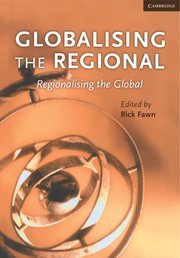Book contents
- Frontmatter
- Contents
- Preface
- Notes on contributors
- ‘Regions’ and their study: wherefrom, what for and whereto?
- Theoretical and thematic approaches
- Regional hierarchy: authority and local international order
- When security community meets balance of power: overlapping regional mechanisms of security governance
- Between the revisionist state and the frontier state regional variations in state war-propensity
- Regional cases
- Index
Regional hierarchy: authority and local international order
Published online by Cambridge University Press: 05 June 2012
- Frontmatter
- Contents
- Preface
- Notes on contributors
- ‘Regions’ and their study: wherefrom, what for and whereto?
- Theoretical and thematic approaches
- Regional hierarchy: authority and local international order
- When security community meets balance of power: overlapping regional mechanisms of security governance
- Between the revisionist state and the frontier state regional variations in state war-propensity
- Regional cases
- Index
Summary
Abstract. The ordering principle of international relations varies widely across regional security complexes and has profound effects on regional order. States form hierarchies over one another based on relational authority, which itself rests on social contract theories that posit authority as an equilibrium of an exchange between a dominant state and the set of citizens who comprise the subordinate state. Regional orders emerge because of the strong positive externalities of social order and economies of scale in its production, and the mutually reinforcing legitimacy accorded the dominant state by local subordinates. This implies that regions characterised by the hierarchy of single dominant states will possess more peaceful regional orders. Regions often described as pluralistic security communities in which cooperation is understood to have emerged spontaneously from anarchy are better described as regional hierarchies in which peace and conflict regulation are the products of the authority of a dominant state.
Introduction
A regional security complex (RSC) is a set of states continuously affected by one or more security externalities that emanate from a distinct geographic area. In such a complex, the members are so interrelated in terms of their security that actions by any one member, and significant security-related developments inside any member, have a major impact on others. Regional orders describe how states within an RSC manage their security relations and range from balances of power, to regional power concerts, collective security organisations, pluralistic security communities, and integration.
- Type
- Chapter
- Information
- Globalising the Regional, Regionalising the Global , pp. 35 - 58Publisher: Cambridge University PressPrint publication year: 2009
- 2
- Cited by

